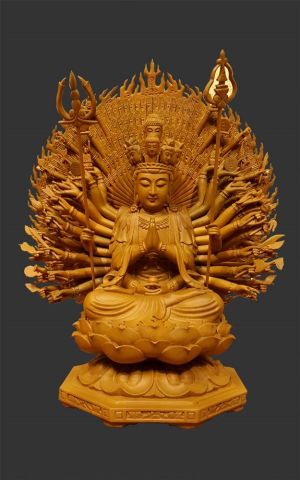Ashvaghosha, Aśvaghoṣa, Ashva-ghosha: 10 definitions
Purana and Itihasa (epic history)
[«previous (A) next»] — Ashvaghosha in Purana glossary
Source: archive.org: Puranic Encyclopedia
Aśvaghoṣa (अश्वघोष).—A famous Sanskrit poet. He has written many Sanskrit books prominent among which are the two great poems, Buddhacarita and Saundarananda and a drama called Śāriputraprakaraṇa. He lived in the 2nd Century A.D. His history of Buddha (Buddhacarita) was translated into Chinese during the period 414 to 421 A.D. He was known under the following names also: Ācārya, Bhadanta, Mahāvādī and Bhikṣu.
The Purana (पुराण, purāṇas) refers to Sanskrit literature preserving ancient India’s vast cultural history, including historical legends, religious ceremonies, various arts and sciences. The eighteen mahapuranas total over 400,000 shlokas (metrical couplets) and date to at least several centuries BCE.
In Buddhism
General definition (in Buddhism)
[«previous (A) next»] — Ashvaghosha in Buddhism glossary
Source: Buddhism Tourism: Glossary of Buddhist Terms
Buddhist poet known for his epic poem, Buddhacarita, the first complete biography of the Buddha
Source: academia.edu: The Chronological History of Buddhism
Ashvaghosha I (1350-1270 BCE).—There were two Ashvaghoshas in the history of Buddhism. Ashvaghosha I was the junior contemporary of Katyayaniputra and lived 500 years after Buddha nirvana whereas Ashvaghosha II Matricheta lived 800 years after Buddha nirvana.
Moreover, Ashvaghosha I was born in Saketa of Kashi Janapada whereas Ashvaghosha II probably belonged to Pataliputra. Ashvaghosha I was the teacher of Mahayana and authored “Mahayana Shraddhotpada”, a philosophical treatise that was also studied in Japanese monasteries. Parshva Katyayaniputra and Ashvaghosha I jointly composed a great treatise “ Abhidharma-Mahavibhasha-Shastra ” in Kashmir. Ashvaghosha I was the disciple of Parshva Katyayaniputra and Punyayashas.
Source: WikiPedia: Buddhism
Aśvaghoṣa (अश्वघोष) or Ashvaghosha (80 – c. 150 CE) was a Buddhist philosopher, dramatist, poet and orator from India. He was born in Saketa in northern India in a Brahmin family and later converted to Buddhism. He is believed to have been the first Sanskrit dramatist, and is considered the greatest Indian poet prior to Kālidāsa.
In Jainism
General definition (in Jainism)
[«previous (A) next»] — Ashvaghosha in Jainism glossary
Source: archive.org: Trisastisalakapurusacaritra
Aśvaghoṣa (अश्वघोष) refers to one of the sons of Vidyādhara-king Aśanighoṣa, according to chapter 5.1 [śāntinātha-caritra] of Hemacandra’s 11th century Triṣaṣṭiśalākāpuruṣacaritra (“lives of the 63 illustrious persons”): a Sanskrit epic poem narrating the history and legends of sixty-three important persons in Jainism.
Accordingly:—“Knowing that Śrīvijaya’s soldiers were eager for battle, Aśanighoṣa instructed his sons for hospitality to battle. Aśvaghoṣa, Śataghoṣa, Sahasraghoṣa, Mahāghoṣa, Bhīmaghoṣa, Ghanaghoṣa, and others; and their sons, Meghaghoṣa and the rest—all with a complete army left by the gate of Camaracañcā for battle. [...]”.
[«previous (A) next»] — Ashvaghosha in Sanskrit glossary
Source: DDSA: The practical Sanskrit-English dictionary
Aśvaghoṣa (अश्वघोष).—Name of a Buddhist writer.
Derivable forms: aśvaghoṣaḥ (अश्वघोषः).
Aśvaghoṣa is a Sanskrit compound consisting of the terms aśva and ghoṣa (घोष).
Source: Cologne Digital Sanskrit Dictionaries: Edgerton Buddhist Hybrid Sanskrit Dictionary Aśvaghoṣa (अश्वघोष).—name of a teacher (and author): Mahāvyutpatti 3480.
Source: Cologne Digital Sanskrit Dictionaries: Monier-Williams Sanskrit-English Dictionary 1) Aśvaghoṣa (अश्वघोष):—[=aśva-ghoṣa] [from aśva] m. Name of a Buddhist patriarch.
2) [v.s. ...] Name of the author of the Buddha-carita (2nd or 3rd cent, [Apte’s The Practical Sanskrit-English Dictionary]D.)
[[[Sanskrit]] to German] (Deutsch Wörterbuch)
Source: Cologne Digital Sanskrit Dictionaries: Böhtlingk and Roth Grosses Petersburger Wörterbuch
Aśvaghoṣa (अश्वघोष):—(a + ghoṣa) m. Nomen proprium eines Buddhisten [[[Burnouf]] 215. fg. 556.] [Lassen’s Indische Alterthumskunde II, Anhang V.] [Akademische Vorlesungen 156, Nalopākhyāna 1.]
Source: Cologne Digital Sanskrit Dictionaries: Sanskrit-Wörterbuch in kürzerer Fassung Aśvaghoṣa (अश्वघोष):—m. Nomen proprium eines Mannes (buddh.).
context information
Sanskrit, also spelled संस्कृतम् (saṃskṛtam), is an ancient language of India commonly seen as the grandmother of the Indo-European language family (even English!). Closely allied with Prakrit and Pali, Sanskrit is more exhaustive in both grammar and terms and has the most extensive collection of literature in the world, greatly surpassing its sister-languages Greek and Latin.
Discover the meaning of ashvaghosha or asvaghosa in the context of Sanskrit from relevant books on Exotic India
See also (Relevant definitions)
Partial matches: Ghosha, Ashva.
Ends with: Bhadanta ashvaghosha.
Full-text (+3): Buddhacarita, Maticitra, Vajrasuci, Bhadanta ashvaghosha, Desana, Buddhaghosa, Kavya, Sahasraghosha, Meghaghosha, Ghanaghosha, Matriceta, Shataghosha, Bhimaghosha, Huvishka, Shalihotra, Bimbisara, Amaya, Harivamsha, Punarvasu, Mahaghosha.
Relevant text
Search found 21 books and stories containing Ashvaghosha, Aśvaghoṣa, Asvaghosa, Ashva-ghosha, Aśva-ghoṣa, Asva-ghosa; (plurals include: Ashvaghoshas, Aśvaghoṣas, Asvaghosas, ghoshas, ghoṣas, ghosas). You can also click to the full overview containing English textual excerpts. Below are direct links for the most relevant articles:
Buddhacarita (by Charles Willemen)
Translator’s Introduction
Mahayana Buddhism and Early Advaita Vedanta (Study) (by Asokan N.)
Chapter 2.13 - The Mahayana Madhyamika system
The Fo-Sho-Hing-Tsan-King (A Life of Buddha) (by Samuel Beal)
History of Bodhisattva Aśvaghoṣa < [Introduction]
Lives of Buddha (9): Fo-pen-hing-king < [Introduction]
Aśvaghoṣa's Style < [Introduction]
Kavyamimamsa of Rajasekhara (Study) (by Debabrata Barai)
Part 7.1 - Origin and development of the Kavisamaya (poetic conventions) < [[[Chapter]] 5 - Analyasis and Interpretations of the Kāvyamīmāṃsā]
Part 2 - Life and Date of Rājaśekhara < [[[Chapter]] 1 - Introduction]
Part 7.2 - Kavisamaya (poetic conventions) and Kāvyadoṣa (poetic blemish) < [[[Chapter]] 5 - Analyasis and Interpretations of the Kāvyamīmāṃsā]
Philosophy of Charaka-samhita (by Asokan. G)
World Construction (Sāṃkhya and Caraka) < [[[Chapter]] 3 - Fundamental Theories]
A History of Indian Philosophy Volume 1 (by Surendranath Dasgupta)
Part 11 - Mahāyānism < [[[Chapter]] V - Buddhist Philosophy]
Part 19 - Brief survey of the evolution of Buddhist Thought < [[[Chapter]] V - Buddhist Philosophy]
Part 4 - Vedānta in Gauḍapāda < [[[Chapter]] X - The Śaṅkara School Of Vedānta]
+ 4 more chapters / show preview
Source
[[Category:]]
[[1]]
